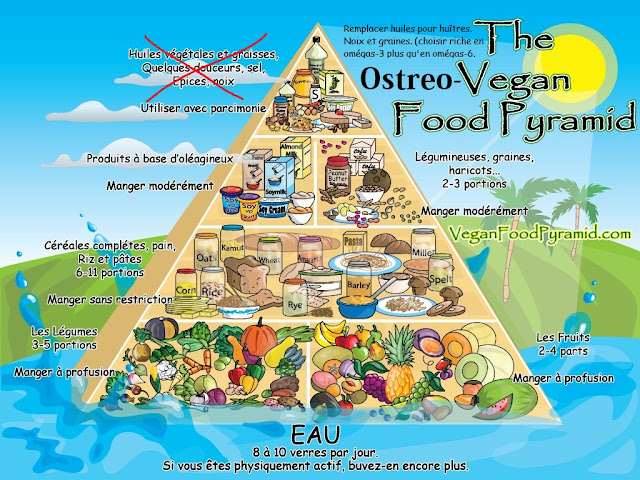Why I now self-identify as an Ostreovegan
A while ago, I read Diana S Fleischman's blog entry about the ethical case for eating oysters (found here: https://sentientist.org/2013/05/20/the-ethical-case-for-eating-oysters-and-mussels/)
It makes a very strong case in the favor of including some oysters in a vegan diet (which Denise Minger also argues on her blog but from a nutritional perspective only). Diana takes a more global approach to the subject. Diana coins two terms to describe herself, 'ostrovegan' and 'bivalvegan'.
I chose to discard the term bivalvegan, since I am not interested in eating mobile mollusks, and the word doesn't specify which bivalves are eaten. In my view, if it moves of its own, then it is more distant from the plant kingdom than close to it, unlike sessile mollusks. So, I chose the word 'ostreovegan'. Ostreo for Ostreidae - or the family of edible Oysters. (Superfamily: Ostreoidea & Order: Ostreoida). This word also makes it easy for me to use the same word both in English and French.
Another thing I realized while reading Diana's blog is that I should embrace the word *vegan* again (at least partly) instead of *plant-based*, which I had adopted. Being 'plant-based' makes it sound like it's just a matter of diet, but it's just not the case for me, and I don't want to mislead anyone: animal ethics matters to me, and the word vegan makes it clear. (Even though the Crohn's program that I initially followed allowed some animal products, I have chosen to discard them for ethical reasons, rather than health reasons.)
Instead of arguing the ethical case for eating oysters here, which was already done by Diane, I will only give my reasons as to why I choose to consume them, which I have posted on Jack Norris' site about this (he is very open to the idea himself). For another view which I found interesting, see Christopher Cox's article here: http://www.slate.com/articles/life/food/2010/04/consider_the_oyster.html
My post (can be found here: http://jacknorrisrd.com/odds-and-ends):
The case for eating oysters is an extremely good one. First, even if we were to give the benefit of the doubt to oysters that they have a degree of sentience (extremely doubtful) — it still causes less harm to raise and eat them than the growing of land plant food, since it [rope grown] doesn’t involve accidental deaths during the harvesting process and it also avoids other issues like habitat displacement as well as deforestation and other issues caused by modern agriculture. In my case, all the oysters I eat are local as well (from PEI), which makes it more eco-friendly than consuming imported fruits, vegetables and grain products.
Secondly, oysters just happen to fill the few gaps of a vegan diet. We can’t find b12 in plant foods, and they happen to be extremely high in absorbable B12. Zinc is harder to get on a vegan diet and as far as I know isn’t as absorbable either, which makes our daily requirements higher than non-vegans (especially as males). An oyster a day solves this issue. It’s also high in iron, which as Jack mentioned, can be a real problem for some people. For me, having IBD and having bloody stools regularly, it is a way to get more absorbable iron as well without relying on supplements. Nutritional supplements are not harmless. Dr. McDougall has shown enough evidence of this and changed my mind on this subject. The less we take, the better. (The only supplement I would feel 100% safe taking is B12, which I'm glad I will never need to worry about now.)
Lastly, I believe that eating oysters has a beneficial mental effect for me. It may seem silly to someone else, but I enjoy feeling like I have a unique, individualized diet, and I am not a follower of anyone or part of a dogmatic, restrictive movement. I am outside of the cult of veganism and the dogma surrounding some of its parts as an ostreovegan. "Vegan purity" being out of the window, so is my desire to rebel against dogma. By self-identifying as an ostreovegan instead of somewhat deceptively as a vegan (depending on your definition of veganism), some vegans will choose to attack me or not associate with me and that is a desired outcome: there will be no surprises and no waste of time befriending dogmatic individuals.
Oysters are also a delicacy, they're not a cheap food so it feels special to eat one. In my experience there is no slippery slope with them like another commenter feared for; it’s not something addictive like other animal flesh foods and dairy products. Personally, it feels like I’m rewarding myself for being on a plant-based diet when I eat one a day. And it suffices. In the town that I live, I do not personally know a single person on a plant-based diet, so having a reward for not conforming to my environment feels good. As someone who relapsed in the past, I feel like this offers consistency and gives me confidence in the belief that I am giving my body everything it needs while living as ethically as I can without adhering to dietary dogma.
Note: My definition of veganism has always been based on the Least Harm Principle. Veganism makes no sense outside of the optic of reducing the harm we cause as much as possible and practicable. It extends far beyond the simplistic view that it's just animal products that are a problem. Animal products aren't the only products that cause harm, many so-called vegan products do (Palm oil being a notorious one). And of course, as we see with oysters and mussels, they don't always cause harm, or if they did it's still less harm than grains and vegetables.
Note 2: As ever, I am always open to changing my mind based on new information. If it turns out that oysters are a freak of nature and essentially outside of evolution, or that there is a malevolent God that created this organism so that it could feel pain and not be able to move away from injury--unlike all other sentient animals--then I will no longer eat them. Until then, if and when a dogmatic vegan attacks me for eating them, I will simply ask them when their next protest for oyster welfare is so that I can attend it and give them a chance to change my mind.


Nice post Emil Loco. Muy Loco. Mas Loco.
ReplyDeletehttps://blogs.umass.edu/natsci397a-eross/7135-2/
ReplyDelete